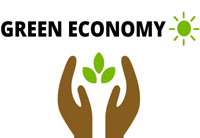The green economy is a revolutionary economic model
Tirthankar Majumder
THE GREEN ECONOMY IS A REVOLUTIONARY ECONOMIC MODEL that prioritizes human well-being, social equity, and environmental sustainability, aiming to deliver economic growth while fostering a symbiotic relationship between nature and humans through a regenerative, circular and inclusive approach. This model is built on the foundation of enhancing human well-being, promoting justice and good governance, decarbonisation, circular economy, and valuing natural capital, which collectively contributes to numerous benefits, including job creation, economic growth, improved public health and poverty eradication. 
The green economy has the potential to create millions of jobs in renewable energy, sustainable infrastructure, and eco-friendly industries, while also driving economic growth and reducing income inequality. Furthermore, by transitioning to renewable energy sources, reducing pollution, and promoting sustainable consumption patterns, the green economy can improve public health and reduce the burden of diseases. By valuing natural capital and preserving ecosystem services, the green economy can help eradicate poverty and ensure that natural assets continue to provide resources and services for human well-being.
Nevertheless, the transition to a green economy poses significant challenges, including energy transition, infrastructure development, and land acquisition, which necessitate careful planning, stakeholder engagement, and strategic investment.
To promote sustainable development and mitigate these challenges, it is crucial to invest in renewable energy sources like solar and wind power, promote sustainable consumption patterns, support green infrastructure development, and foster international cooperation to share knowledge, technologies and best practices. Moreover, governments, businesses, and civil society must work together to create a supportive policy environment, provide incentives for green investments, and raise awareness about the benefits of a green economy. By working together and adopting a collaborative approach, we can create a more sustainable, equitable, and resilient future for all, where economic growth is balanced with environmental protection and social justice, ultimately ensuring a high quality of life for present and future generations.
This requires a fundamental shift in our economic paradigm, from one that prioritizes growth at the expense of the environment and social equity to one that recognises the intrinsic value of nature and the importance of human well-being.
By making this shift, we can create a better future for all, and ensure that our planet remains a vibrant and thriving home for generations to come.
(The author is the Senior Technical Officer, Climate Resilience of Forest Ecosystems, Biodiversity & Adaptive Capacities of Forest Dependent Communities in Tripura under the Forest Department.)
August 16, 2025